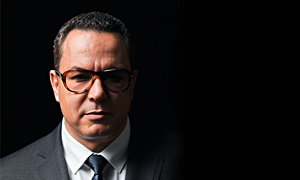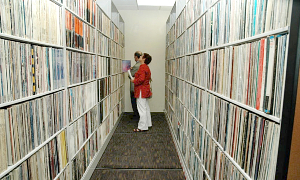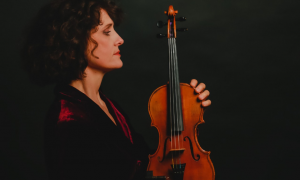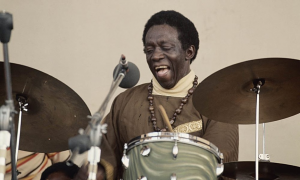Home » Jazz Articles » Chats with Cats » The Mentor: Katherine McVicker
The Mentor: Katherine McVicker

In this day and age, musicians need to have more tools in their kit than ever before: strong presence on social media and streaming platforms; excellent materials such as great photos, videos and audio recordings; and a great website are all essential.
—Katherine McVicker
Learning to navigate these developments is a challenge for folks in the business, let alone musicians who ultimately just want to make music. It's almost a necessity, now, that an artist not only be great at their art, but also have the essentials of self promotion in place to begin their career. Those basic tools include quality photos, video and audio samples. It also really helps to be savvy at social media until they can find professionals to handle this for them.
While there have never been more resources available to anyone managing a career on their own, it helps to have the guidance of someone whose job it is to develop an artist's profile. One such mentor is Katherine McVicker who has been a successful booking agent and manager for some of the most prominent names in jazz. Her experience is vast and she has put her knowledge into a course to help those who want to push their careers forward.
About Katherine McVicker
Katherine McVicker is a well-established professional in the music industry. She has launched the touring careers of several artists including Norah Jones, developing Jones' European profile for seven years. After three decades in the music industry as an agent developing the touring careers for dozens of internationally renowned jazz and world artists, McVicker founded boutique agency Music Works International (MWI) in 2014. Today, with agents based in Europe, the United States and Latin America, MWI books over 500 performances each year worldwide and represents over 40 of the top contemporary jazz, Americana and world music artists.During the 2020 COVID-19 lockdown, McVicker developed a course for musicians and those struggling to book shows. The aptly named, Anyone Can Book a Gig is a self-managed online course with the goal to give artists the no-fluff tools and strategies they need to successfully book shows at any stage of their career. This course can be found at her website.
McVicker is also active in the international cultural community as an organizer of Arts Connect Africa and Cultural Connections of Latin America (CCLA). Both networks share the mission of connecting cultural stakeholders to each other for professional development and mentorship, to create and support educational initiatives, to facilitate cultural exchange and to support economic development through the cultural arts.
All About Jazz: You have a long history in booking tours and artist development. How did you get into that in the first place?
Katherine McVicker: I went to school at Berklee College of Music in the 1980s and was a professional musician for 13 years. I started out playing jazz clubs in Boston but it didn't take too long for me to figure out I couldn't support myself on the money these gigs paid. I decided to create a great band (all on Berklee College of Music faculty) that could play great dance music and also play the jazz tunes I loved but for a sophisticated clientele. We became one of the top bands for corporate events and private parties in the greater Boston/ New England area and were one of the recommended bands for The Ritz Carlton, The Four Seasons, as well as estates in Newport and other exclusive locations. This taught me how to build a business, negotiate deals and run a band. We determined our target market, created great promo materials, created a strategy for success that included networking with meeting and event planners. We had such great success I was able to buy a house within 5 years.
In 1987 I started to work for a start-up jazz agency and began learning how to book tours across the US and Canada. I was very lucky to have a great mentor, who supported me and taught me how the music industry works. I used the same entrepreneurial skills I taught myself, to make strategic plans for our roster of artists to expand their performance opportunities and build audiences.
AAJ: You started your own boutique agency, Music Works International. What inspired you to go out on your own?
KM: I worked at the same agency for many years and decided I wanted to try a new challenge—new artists, new territories and new initiatives . Over the last 10 years MWI has curated a strong roster, built initiatives in education, developed consultancy opportunities for the company and has developed cultural arts networks in Latin America and Africa. I also expanded our work into Asia, Australia and the Pacific Rim. It's been wonderful to work in new territories and to offer our clients opportunities to perform worldwide and to forge new alliances with cultural stakeholders in new regions.
AAJ: What do you look for in a musician to consider them for your roster?
KM: The industry has changed dramatically over the last years in so many ways. In this day and age, musicians need to have more tools in their kit than ever before: strong presence on social media; on streaming platforms; excellent materials such as great photos, videos and audio recordings; and a great website are all essential. I also look for artists who want to develop their careers, not just play shows. We work best with artists who have clear goals and can make a plan for success.
AAJ: What are some of your greatest successes?
KM: I have had the privilege of working with some of the top artists in jazz—really too many to name but including artists like Herbie Hancock, Wayne Shorter, McCoy Tyner, Brad Mehldau, Joshua Redman, Michael Brecker, David Sanborn, Youssou N'Dour, Dianne Reeves, Lizz Wright, Richard Bona, Ladysmith Black Mambazo and so many others, I'm most grateful and proud of the artists I had the opportunity to work with from the start of their careers like Norah Jones, Esperanza Spalding, Samara Joy, Richard Bona, Lizz Wright, Chief Adjuah, and Jason Moran, to name a few. Some of these have moved on to other agencies but others have stayed with me for years. To see their success and to know I had any small part in it is an honor I will always be grateful for.
AAJ: Tell me about this course you've developed for musicians who are doing it all themselves.
KM: During the pandemic, when we lost all our tours, I had time to consider what my worth was in the industry. Most agencies are valued by the artists they represent. Certainly, we make more money if we have artists who command big fees and having big artists opens many doors. Artists come and go. I hope my experience and knowledge is my value, not just the artists we work with. I'm a facilitator, a worker bee, a member of the artists' team working with the other worker bees—managers, product people at the labels, publicists, road managers, promoters, producers.
Since I come from a background of being a musician myself, I know how hard it is to make headway in what has become an insanely complicated industry. I decided I would break things down into a progressive course to teach musicians basic information about how the touring industry works, how to advocate for yourself as a musician, how to plan for success and how to make money playing music. Most young musicians will not get an agent, a manager or really much attention from anyone in the industry if they are just starting out and have no experience or tour history so they need to figure out how to do it themselves.
AAJ: What are the key elements that musicians need to know about marketing themselves?
KM: First you need to know where you are professionally and be able to describe your music . If you can't tell people what kind of music you play and what makes you special, how can you convince someone your music has an audience. How would you find that audience? If you know your accomplishments and can describe your music, then you can write a good biography. You need great assets—high resolution photos, video and audio recordings (live video is especially good so someone can see and hear what you're like live), an EPK is particularly helpful, social media accounts and a website. Put all of these items in a folder so it's readily available for soliciting gigs and for quick access to promoters when you book that gig. Make sure your links work! The first two sections of the course deal with getting your materials together and telling your story.
AAJ: Can a musician be successful without having professionals such as booking agents and managers behind them?
KM: Yes. Musicians have so many opportunities that I never had when I was playing. The internet is your best friend . You can research venues, see what your competition is doing for gigs and what their materials look like, you can put your own music out on a variety of platforms. And, most managers and agents can't afford to take you on if you can't already make money. Once you start getting some traction in the way of followers, gigs, and social media hits, you will be more attractive for a manager or agent to take you on. You will have proved you have focus, a plan and a fan base.
AAJ: You also run non-profits promoting music from Africa and Latin America. How did that come about and what are your objectives?
KM: I have been working in Africa for over 24 years. I booked many shows all over the continent but it is difficult to actually tour because there is very little infrastructure. I wanted to expand opportunities for my clients and it became clear to me that just booking more shows wasn't going to make a big difference. The challenge is a greater one. In 2019, we created a nonprofit, Arts Connect Africa (ACA), with a mission statement that includes four pillars: Education, Cultural Exchange, Professional Development and Economic Development through culture. In 2020, we created a sister network Cultural Connections Latin America (CCLA) with the same mission statement. We strive to create South to South cultural exchange and cooperation across both Africa and Latin America. The goal is to create cooperation, and collaboration, sharing our ideas and experience with promoters across the globe. For my company, WMI, booking more shows for our artists is the result, not the mission.
AAJ: What is your prognosis of the current live music scene and how does it look in the near future?
KM: I believe the jazz ecosystem will always thrive. Because the nature of the art is improvisational, there will always be a loyal audience who will come to live performances to hear something new. It's different than pop music where the audience is bigger but they want to hear the same solo they heard on the record. And, in pop music, trends come and go quickly. Jazz careers have a longer arc and artists have more opportunities but they also have more responsibility for their own careers.
AAJ: Is there anything else you'd like to tell me?
KM: I love my job. I work with incredible artists. I travel. I meet very interesting and special people who always enrich my knowledge and my life. I am exposed to endless great music and creativity. I enjoy our worldwide jazz community. I've built friendships with artists, promoters, publicists, managers, road managers, media people and people of all jobs who support live music. Lucky me!
Tags
Comments
PREVIOUS / NEXT
Support All About Jazz
 All About Jazz has been a pillar of jazz since 1995, championing it as an art form and, more importantly, supporting the musicians who make it. Our enduring commitment has made "AAJ" one of the most culturally important websites of its kind, read by hundreds of thousands of fans, musicians and industry figures every month.
All About Jazz has been a pillar of jazz since 1995, championing it as an art form and, more importantly, supporting the musicians who make it. Our enduring commitment has made "AAJ" one of the most culturally important websites of its kind, read by hundreds of thousands of fans, musicians and industry figures every month.





























